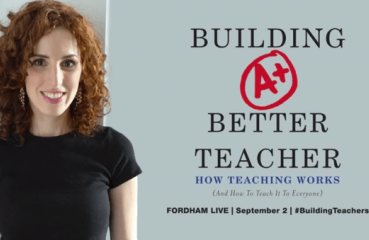Farewell to Graham Down
There is little that I might add to Checker and Mike's wonderfully fitting tribute to Graham Down. They captured the very essence of a remarkable, multi-faceted, true Renaissance man.
Time to focus on tenure
Michael BrickmanJudging by the rhetoric of some legislators and wonks, it may come as a shock that public policy is not the stuff of magic whereby just the right regulatory language will, like one of Harry Potter’s spells, instantly reduce a monster of a problem to dust. Instead, policy is about the careful consideration of a series of tradeoffs. Education reformers in particular have been accused of leaping from one panacea to the next, rather than carefully considering practical alternatives. That doesn’t mean, however, there aren’t still a number of critical ingredients that must be a part of any witch’s brew to cure what ails our education system. One of them is the reform of, if not removal of, tenure.
Ferguson, reparations, and institutional roots
Andy’s odyssey: Part four: The most convincing argument against conservatism is that by defending longstanding institutions it ends up protecting longstanding injustices. Yes, there is a prima facie case for preservation: It’s sensible to safeguard
Connecting the dots: E. D. Hirsch, Jr., and Common Core
Robert PondiscioOne of the arguments I’ve long made in support of Common Core is that properly understood and implemented, it’s a delivery mechanism for the ideas and work of E. D. Hirsch, Jr., and the Core Knowledge curriculum he created.
A fern between two Mikes: The Vergara fight goes coast to coast
Fordham's Mike Petrilli and AEI's Mike McShane discuss the growth of Vergara-like fights nationwide and the pros and cons of taking the tenure debate to the courts.
We'll Miss You, Graham Down
Michael J. Petrilli, Chester E. Finn, Jr.Long before today’s education-reform movement was born, indeed long before A Nation at Risk, there was the Council for Basic Education (CBE), founded in 1956
VIDEO: Building a Better Teacher: How Teaching Works (and How to Teach It to Everyone)
This is a conversation and discussion with Elizabeth Green on new book, Building a Better Teacher: How Teaching Works (and How to Teach It to Everyone).
Strings attached to NYC preschool dollars
The Education GadflyNew York City Mayor Bill de Blasio’s offer to subsidize full-day pre-K programs came with a number of strings attached, and many religious organizations are refusing to play along.
The Condition of College & Career Readiness
Jessica PoinerApproximately 1.85 million students—or 57 percent of the U.S. high school class of 2014— took the ACT in 2014. That’s an 18 percent uptick since 2010, despite the overall number of graduates decreasing by 3 percent. Twelve states boast a 100 percent participation rate; yet all of them, predictably, have composite scores below the national average of 21.
Peer Effects in Early Childhood Education and Peer Effects in Urban Schools
Aaron ChurchillTwo new studies add to the growing body of peer effects research that confirms what seems self-evident: learning alongside motivated, smart students enhances student outcomes. The first examines the peer effect on pre-K students diagnosed with a disability.
What Effective Schools Do
Robert PondiscioThis much-discussed study, published in the current edition of Education Next, finds that “oversubscribed charter schools” in Boston produce strong test-score gains but “do not improve students’ fluid cognitive skills.” Put another way, the study shows high-performing charters are getting great results improving “crystallized knowledge”—b
The states versus Secretary Duncan
Brandon L. WrightLast week, Louisiana Governor Bobby Jindal sued the U.S. Department of Education over the Common Core State Standards (CCSS), with a particular focus on the role that Race to the Top (RTTT) played in encouraging their adoption. And three days later, rumors arose that Oklahoma Governor Mary Fallin might haul that same agency into court for revoking its No Child Left Behind (NCLB) waiver.
Restarting the Common Core debate
Michael J. PetrilliOver the past couple of years, a raucous debate has emerged over the Common Core, content standards in English and mathematics adopted by states nationwide. The debate has been marked by acrimony rather than analysis, but there is hope that both sides want a reset.
5 questions for Rick Hess
Michael J. PetrilliIn NRO today, Rick Hess explores “five half-truths” that he says supporters of the Common Core like to propagate. These spurred five questions of my own:
Thanks, Bobby Jindal!
Robert PondiscioIt’s too soon to guess TIME Magazine’s person of the year, but a clear favorite has emerged for Common Core person of the year: the man, woman, or group that has done the most to advance the adoption and implementation of Common Core State Standards in the U.S. Ladies and gentleman, for meritorious service to further the cause of rigorous academic standards and educational excellence, please put your hands together for the governor of the great state of Louisiana, Common Core Man of the Year, Bobby Jindal!”
Pathways to Teacher Leadership: Emerging Models, Changing Roles
Megan LailNearly half of all new teachers will quit within five years, and countless studies demonstrate the detrimental financial and academic effects of such turnover.
The Long Shadow: Family Background, Disadvantaged Urban Youth, and the Transition to Adulthood
Michelle LernerEducation-policy wonks should take a long look at The Long Shadow, a book based on a twenty-five-year study by Johns Hopkins University researchers.
Arne pumps oxygen back into Common Core implementation
The Education GadflyLast week, U.S. Secretary of Education Arne Duncan declared that states with NCLB waivers could wait until the 2015–16 school year to start tying test scores to teacher evaluations.
An elder statesman speaks
Terry RyanBeing an education reformer is often frustrating. No matter how zealously we push an idea or how smart we think it is, sometimes nothing changes. Or—the Common Core is a recent example—we make fast, bold gains at the outset, only to see our efforts watered down, neutered, or repudiated outright...
Making teaching teachable
Robert PondiscioMany of our recent ed-reforms—e.g. Teach for America, alternative certification, the Hamilton Project, and various “new teacher” projects—implicitly subscribe to the idea that great teachers are born, not made. Ed schools, too, largely consider “training” teachers to be beneath their dignity. Hence the path to instructional excellence is to welcome all sorts of smart people into the classroom via all sorts of entry paths, then weed out those who don’t cut it.
Watch: UFT, your zebra stripes are showing
Ellen AlpaughThe New York chapter of the United Federation of Teachers participated in an anti-police brutality rally this past Saturday, prompting the question of what exactly does the union stand for: teachers or a political agenda?
Making sense of the ed-reform backlash
Michael J. PetrilliThis post is an excerpt from a speech I gave last week at the Oklahoma City Chamber of Commerce’s state of the schools event.
ExcelinEd on the dos and don'ts of course access
Michael BrickmanBack in May, Fordham published Expanding the Education Universe: A Fifty-State Strategy for Course Choice, where we explained the idea of “cour
A plea to Marc Tucker (and his colleagues)
Marc Tucker is the author of an important new report: Fixing Our National Accountability System. Although Marc and I disagree on the promise of Relinquishment (most specifically on charter schools), I agree with much of this thinking. But, in this report, Marc makes a strategic mistake in dismissing choice-based reforms. To put it another way: if there is a grand bargain to be made that significantly increases student achievement in the United States, it could look like this: Reduce testing frequency and increase testing rigor Improve the quality of the teaching force Increase charter schools and choice














